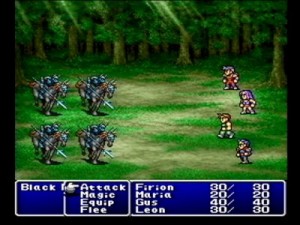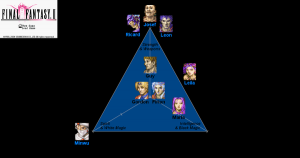 This week, a realization struck me quite literally in the middle of the night (I’ve been having off-and-on insomnia issues) that caused me to think long and hard about the reasons I continue having trouble with the early Final Fantasy titles (specifically this one—II—at which I’m still dedicatedly hacking away).
This week, a realization struck me quite literally in the middle of the night (I’ve been having off-and-on insomnia issues) that caused me to think long and hard about the reasons I continue having trouble with the early Final Fantasy titles (specifically this one—II—at which I’m still dedicatedly hacking away).
To bring this into context, let me describe the incident which led up to my epiphany. I mentioned last week that I was now officially further along in FFII than I had ever been before, and that as a result, I was heading into brand-new content that I hadn’t seen before. My first major foray into this content was a dungeon which, as the guide I’ve been following informed me, wasn’t mandatory at this particular part of the adventure; it should have been well within reach ability-wise, and could help with leveling characters, gaining new equipment, and otherwise preparing me a bit better for the trials that lay ahead, but story-wise, it wasn’t a place that I needed to go to until much later. I thought it might be a good test to see if my party was able to hang with the crowd in this slightly higher-level area, so I set off in my newly obtained ship, consulted my maps, and found the tiny island in the middle of nowhere where the dungeon was located.
As I’ve mentioned before, dungeons in these early games are generally large and multi-level, with no save points. This means that while you can retreat to use recovery abilities (staying at inns, replenishing supplies, and so forth) and to save your progress, you take what I’ve always seen as a pretty major hit to do so; if you’re on floor five of a six-floor dungeon, it’s difficult to give that up knowing that you’ll have to do it all again. At least, it’s tough for me.
While the enemies I was facing were definitely more difficult than those I’d encountered in the normal course of things, I wasn’t having too much trouble cutting through them. However, I was expending more resources than I was used to. Specifically, my normal play-style meant that I had been attempting to conserve my magic abilities, saving them for when they were truly needed, as I progressed through each area. Since in-dungeon recovery is limited, and items to replenish magic power without that are usually prohibitively expensive, particularly early on, it made sense to save my healer’s magic for when I really needed it to bump up my fighters, and to save my mage’s magic for when I really needed it to damage physically-resistant monsters and bosses.
This dungeon, though, went differently. Since the monsters were tougher and more prone both to hurting my frontline fighters (costing more healer magic to fix them) , and to being more vulnerable to high-level offensive spells (costing more mage magic to blast them), I was faced with a choice: should I attempt to continue with my policy of conservation, knowing that it might ultimately fail and mean my doom, or should I give in a bit, use the magic as needed , and escape from the dungeon periodically, knowing that I’d have to redo much of what I had already accomplished, potentially several times?
 I chose the latter, and that’s where things differ from most of how I’ve played these types of games before. My mindset has always been that if you’re not actively moving forward through a dungeon, it’s almost a waste of time. It’s different if you’ve set out to grind for experience or loot, because you expect to have some monotonous time where all you do is run around in circles. When heading into a dungeon, though, it makes more sense to be pushing forward to progress the story, not turning back every two floors because you need to heal up. That’s a sign of weakness—right?
I chose the latter, and that’s where things differ from most of how I’ve played these types of games before. My mindset has always been that if you’re not actively moving forward through a dungeon, it’s almost a waste of time. It’s different if you’ve set out to grind for experience or loot, because you expect to have some monotonous time where all you do is run around in circles. When heading into a dungeon, though, it makes more sense to be pushing forward to progress the story, not turning back every two floors because you need to heal up. That’s a sign of weakness—right?
No, as it turns out. This was the realization I came to, and perhaps it’s obvious to everyone but me, but it honestly changed the way I’m looking at this game: they WANT you to do those floors again. They’re set up for that. It’s almost Demon’s/Dark Souls-esque in a way, because as you do each subsequent run-through, your routes get more and more efficient, the treasures you’ve picked up no longer require that you scour each floor and take all of the hidden side-routes, and of course, you gain experience and greater loot, meaning that battles get easier and take less time. For all of those reasons, it’s much easier to get to the point where you were before each time you back out of a dungeon and then plunge back in. This is old ground, and while you are re-treading it, there’s definitely a reason behind it. I just had to remove my mental block to see that.
To balance out my newfound satisfaction at this discovery, I then went to the nearest town and ran around outside getting turned to stone by goddamn Cockatrices every half-dozen encounters. You know what’s expensive? FIXING PETRIFICATION.
WEEK 6 PROGRESS: 17 hours 2 minutes into Final Fantasy II